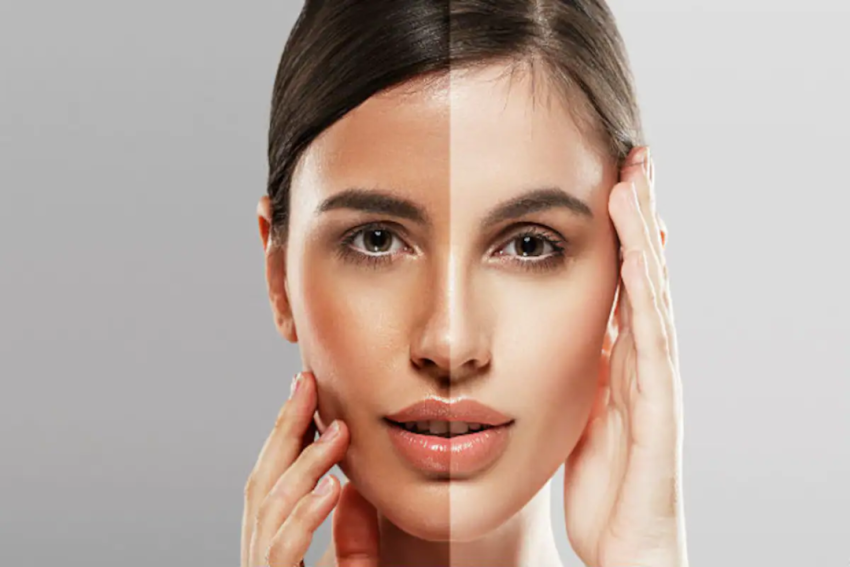For your skin to be healthy and have a healthy shine, proper maintenance is crucial. Navigating the skincare industry can be difficult with the wide range of products and routines currently accessible. We will reveal the keys to beautiful, healthy skin in this post, assisting you in reaching the complexion of your dreams.
Table of Contents
Understanding Your Skin Type
Knowing your skin type is essential before beginning a skincare routine. Normal, oily, dry, and combo skin types are the four most common types. Knowing your skin type enables you to choose ingredients and products that are tailored particularly to your skin’s requirements.
Determining Your Skin Type
Cleanse your face properly, then wait an hour without using any products to find out what type of skin you have. Afterward, pay attention to how your skin looks:
- Normal Skin: appears balanced and is neither either oily or excessively dry.
- Oily Skin: looks shiny and can have pores that are noticeable, particularly in the T-zone.
- Dry Skin: flaky spots and a tight feeling.
- Combination Skin: greasy in the T-zone and dry in other regions, displaying traits of both oily and dry skin.
The Fundamentals of Skincare
Create a reliable skincare routine after determining your skin type. You may attain healthy, radiant skin by following these basic steps:
1. Cleansing
Any skincare programmer must start with proper cleansing. Use a gentle cleanser with a pH matched for your skin type. Cleaning gets rid of impurities, extra oil, and dirt, allowing your skin to breathe and properly absorb products.
2. Toning
Toning helps balance the pH of your skin and makes it more receptive to serums and moisturizers. Depending on your skin type, look for toners that contain natural components like rose water or witch hazel.
3. Moisturizing
Water intake is important for all skin types. If you have oily skin, pick a lightweight moisturizer; if you have dry skin, pick a rich, nourishing moisturizer. Your skin will stay soft and won’t lose moisture if you moisturize.
4. Sun Protection
Premature aging and skin damage can be avoided by protecting your skin from damaging UV radiation. Even on cloudy days, use broad-spectrum sunscreen with at least SPF 30.
Tailoring Your Skincare Routine
Once you’ve mastered the fundamentals, tailor your regimen by using items that are designed to treat particular skin problems. Following are some typical skincare issues and the ingredients that address them:
1. Acne-Prone Skin
Look for acne-fighting products with:
- Salicylic Acid: unclogs pores and exfoliates.
- Benzoyl Peroxide: fights germs that cause acne.
- Tea Tree Oil: possesses antimicrobial properties.
2. Anti-Aging
Include these nutrients in your diet to delay the effects of aging:
- Retinol: smoothes out fine wrinkles and stimulates the formation of collagen.
- Vitamin C: removes dark spots and brightens the skin.
- Hyaluronic Acid: enhances and hydrates skin.
3. Hyperpigmentation
Consider using: to lighten dark patches:
- Niacinamide: evens out skin tone and lightens dark spots.
- Alpha Arbutin: reduces hyperpigmentation’s visible effects.
Nourishing Your Skin from Within
Internal health begins with the skin. Adopt a balanced diet and stay hydrated in addition to maintaining a regular skincare regimen. Consuming antioxidant-rich foods, fruits, and vegetables nourishes your skin from the inside out, fostering a healthy complexion.
Conclusion
Discovering the secrets of skincare is a journey that calls for commitment and knowledge. You may obtain healthy, glowing skin by determining your skin type, adhering to the basic principles, and tailoring your programmer to address certain difficulties. To keep your skin looking young and healthy, remember to nurture it from the inside out and use sunscreen.
Read Advantages Of Castor Oil For Lips That You Want to Know
FAQs
- How often should I cleanse my skin? It’s best to cleanse your skin twice daily – once in the morning and once before bedtime.
- Can I skip moisturizer if I have oily skin? No, even oily skin needs moisturization. Opt for lightweight, non-comedogenic moisturizers.
- At what age should I start using anti-aging products? It’s never too early to start. You can incorporate anti-aging products in your late 20s or early 30s.
- Can I use multiple serums in my skincare routine? Yes, you can layer serums based on their consistency and ingredients, but avoid overloading your skin.
- Is natural sunscreen effective? Natural sunscreens can be effective but may have lower SPF levels. Look for broad-spectrum protection.

